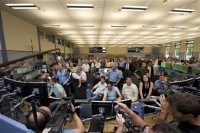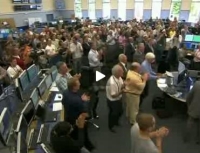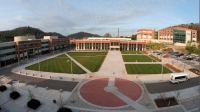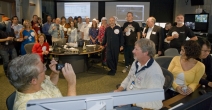 |
|
|
 |
From CERN: First beam in the LHC - accelerating science

In the CERN Control Centre yesterday (Photo: CERN) |
Geneva, 10 September 2008. The first beam in the Large Hadron Collider at CERN1 was successfully steered around the full 27 kilometres of the world's most powerful particle accelerator at 10h28 this morning. This historic event marks a key moment in the transition from over two decades of preparation to a new era of scientific discovery.
“It's a fantastic moment,” said LHC project leader Lyn Evans, “we can now look forward to a new era of understanding about the origins and evolution of the universe.”
Starting up a major new particle accelerator takes much more than flipping a switch. Thousands of individual elements have to work in harmony, timings have to be synchronized to under a billionth of a second, and beams finer than a human hair have to be brought into head-on collision. Today's success puts a tick next to the first of those steps, and over the next few weeks, as the LHC's operators gain experience and confidence with the new machine, the machine's acceleration systems will be brought into play, and the beams will be brought into collision to allow the research programme to begin.
Read more...
|
 |
|
|
 |
Upcoming meetings, conferences, workshops
ILD meeting
Cambridge, UK
11-13 September 2008
Conference on the Design/ Optimization of the Silicon Detector at the International Linear Collider
University of Colorado at Boulder, Colorado, USA
17-19 September 2008
Workshop of the Collaboration on Forward Calorimetry at ILC
Belgrade, Serbia
22-24 September 2008
Workshop on Sources of Polarized Electrons and High Brightness Electron Beams (PESP 2008)
JLab, Newport News, Virginia, USA
1-4 October 2008
EUDET Annual Meeting 2008
Nikhef, Amsterdam, The Netherlands
6-8 October 2008 18th International Symposium on Spin Physics (SPIN 2008)
University of Virginia, Charlottesville, VA, USA
6-11 October 2008 CLIC08 Workshop
CERN
14-17 October 2008
Upcoming school
Third International Accelerator School for Linear Colliders (2008 LC School)
Oak Brook, Illinois, USA
19-29 October 2008
|
|
 = Collaboration-wide Meetings = Collaboration-wide Meetings
GDE Meetings calendar
View complete ILC calendar
|
|
|
 |
 |
|
|
 |
First beam in the LHC
You can witness it even if you weren't there

Watch the re-run of the first beams in the LHC. (Video: CERN Audiovisual Service) |
Wednesday must have been one of the biggest days in science history. It certainly was the biggest day in particle physics for a long time coming - the first full beam around the LHC. The first protons completed the full circle at 10:28 am (less than an hour after first injection), and scientists in CERN's control rooms cheered and clapped, ran to the screens, pointed at monitors and breathed a massive, communal sigh of relief.
Amazingly, after a cryogenic glitch around lunchtime, another first beam made its first full lap in the opposite direction at 15:03. The media centre in CERN's Globe was abuzz, French media had gathered in a Paris bar to follow the events, German press was connected via a multi-way videoconference and at Fermilab scientists and press watched in dressing gown and pyjamas. It was a picture-book start-up.
- Watch the re-run
- See the pictures.
-- Barbara Warmbein |
 |
|
|
 |
Top world news
Sorry NewsLine readers - we are overwhelmed! The LHC start-up was the main news story for days running in print, radio and TV. We had to give up collecting articles as it was impossible to make a selection. We apologise and suggest you run a google news search and enjoy the lively reports. |
|
From Boston Globe
8 September 2008
All eyes on collider as it comes to life
...What scientists discover at the Large Hadron Collider will also help set the path for the next big experiment, the International Linear Collider, which will smash together another family of particles, called leptons.
Read more... |
|
From Chicago Tribune
8 September 2008
WHEN THEORIES COLLIDE
Why the Earth could end when the new collider fires up
...The dream outcome of this science thriller for Fermilab would be a sequel: the International Linear Collider, an even bigger and more expensive device that would build on the European collider's findings.
There's no word yet on whether the proposed collider would pose a threat to life as we know it.
Read more... |
|
From CERN press release
5 September 2008
CERN reiterates safety of LHC on eve of first beam
The LHC is safe, and any suggestion that it might present a risk is pure fiction.
Read more... |
|
From Fermilab press release
3 September 2008
Fermilab physicists discover "doubly strange" particle
The discovery of the doubly strange particle brings scientists a step closer to understanding exactly how quarks form matter and to completing the “periodic table of baryons.
Read more... |
|
From Cosmos
5 September 2008
Are scientists about to explain dark matter?
European astrophysicists have reported on possible evidence of the elusive particles behind dark matter, controversially using data leaked from an international conference.
Read more... |
|
From Cornell Chronicle
4 September 2008
Particle accelerator will benefit society, physicist Yuval Grossman says
...the potential benefit is huge -- from the possibility of answering questions about mass, dark matter and the origins of the universe, to spinoffs including lifesaving medical applications and advances in computer science.
Read more... |
|
From Scientific American
4 September 2008
What Happens to Particle Accelerators After They Are Shut Down?
Read more... |
|
From Nature
4 September 2008
Cool philosophies
High-energy physicists should not gloss over fundamental conundrums.
Read more... |
|
From El País
3 September 2008
Llega la hora de la gran colisión
El diseño, construcción y montaje de esta máquina científica supone tantos retos que es difícil elegir los más llamativos.
Read more... |
|
|
 |
 |
|
|
 |
US National Science & Technology Summit

Oak Ridge National Laboratory, host of the Science and Technology Summit |
The US government policy for support of science and technology is being developed around the 2007 America Competes Act, a consensus policy to strengthen long-term US economic competitiveness through science and technology. This act calls for a substantial increase in US investment in science and technology, including an approximate doubling of the funding for the National Science Foundation over a five-year period, and an almost similar increase for the Departement of Energy (DOE) Office of Science. Consequently, the President proposed increased budgets. President and Congress approved them with bipartisan support last year. Unfortunately, they were interrupted by the Omnibus Bill that so adversely affected high-energy physics funding, including the ILC. Hopefully this plan will resume on track in the next US budget. The Act directed the President to "convene a National Science and Technology Summit to examine the health and direction of the United States' science, technology, engineering, and mathematics enterprises," and to issue a report on the Summit results. That summit meeting was held on 18 August 2008 at Oak Ridge Laboratory.
Read more...
-- Barry Barish
Director's Corner Archive |
 |
|
|
 |
Start-up in pyjamas

From Fermilab Today: first images from Fermilab's LHC start-up 'Pajama Party'. Pictured: Fermilab Director Pier Oddone waits to speak with CERN Director General Robert Aymar after the first beam injection early Wednesday morning.
|
|
EUROTeV Reports
2008-044
Mechanical Design of Collimators for the ILC
2008-045
Measurement of Collimator Wakefields at End Station A
2008-046
Wakefield Calculations - Comparison between Simulation and Experimental Data
2008-047
Design of the Photon Collimators for the ILC Positron Helical Undulator
|
|

